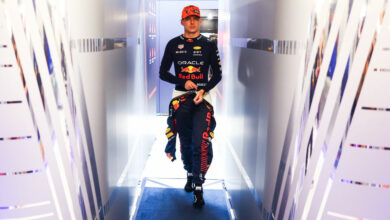Max Verstappen’s Dominance and Formula 1’s Business Model: A Closer Look
Analyzing the Impact of Verstappen's Low-Profile Lifestyle on F1's Commercial Success
In a recent analysis, Max Verstappen has been labelled “the biggest risk” to Formula 1’s business model. Despite his impressive track record, his low-profile lifestyle, and overwhelming dominance in recent seasons have raised concerns about their impact on the sport’s appeal.
Max Verstappen stands out not just for his exceptional skill on the track but also for his unique approach to fame and publicity. Unlike many of his predecessors and peers, Verstappen has consistently shied away from the spotlight. His preference for a quiet life in Monaco, focusing on family and sim racing, is a stark contrast to the glamorous lifestyle often associated with World Champions.
During an interview with TIME magazine, Verstappen’s clear disinterest in socializing with celebrities and his unwavering dedication to racing became evident.
“I have no desire to be able to hang out with famous movie stars.
“I watch other sports, but there’s nothing really that I’m really passionate about.”
His dominance on the track, winning 17 out of 20 races this year, has coincided with a reported decline in viewership, raising questions about the sustainability of such a one-sided competition despite F1’s push for a more even grid.
Barton Crockett, a senior research analyst for Rosenblatt Securities, has been closely monitoring the impact of Verstappen’s dominance on Formula 1’s business prospects. Crockett, who specializes in covering Liberty Media, the parent company of Formula 1, brings a unique perspective to the table.
Nonetheless, this approach has sparked concerns regarding its effect on Formula 1’s wider appeal. Kelly Piquet, Verstappen’s girlfriend, has gone as far as to emphasize the necessity of reminding him to occasionally step away from his intense racing focus.
“There have been times where I’ve been like, ‘OK, time to switch off,’” Piquet admitted. “You have to give a gentle reminder that the sun is shining outside and, you know, there are other things to do.”
His research delves into the intricate balance between a sport’s competitive nature and its commercial success. Crockett’s insights are particularly valuable in understanding the potential long-term effects of Verstappen’s current reign in Formula 1.
“As great as Verstappen is, right now he looks like the biggest risk to the business,” he admits.
Despite these concerns, Formula 1 has not seen a significant downturn in its financial success. The sport generated $2.57 billion in revenue last year, a 44% increase since 2017. Moreover, upcoming events like the Las Vegas Grand Prix are expected to draw large crowds and potentially surpass the economic impact of major events like the Super Bowl.


